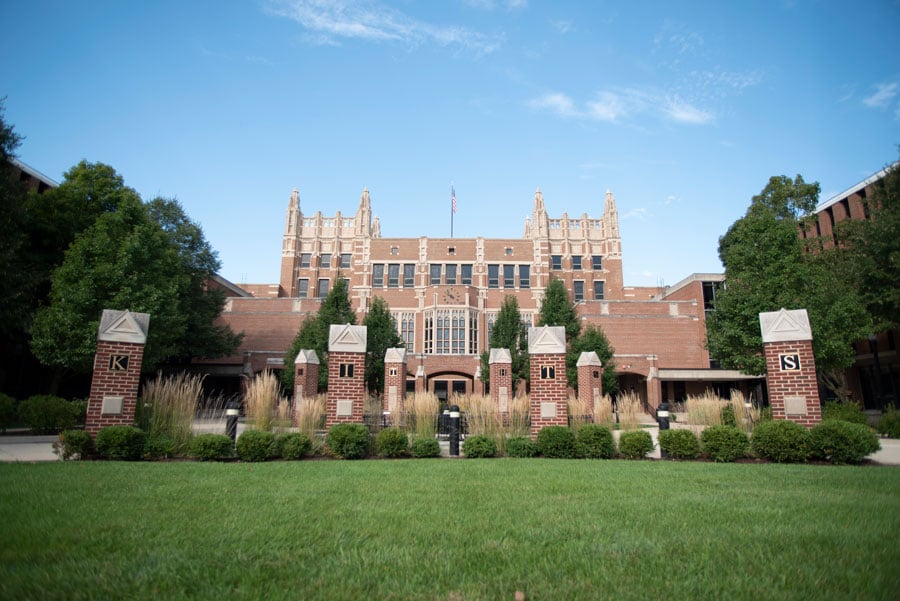District 202 board members discuss racial academic achievement gap, proposed tax levy
Daily file photo by Colin Boyle
Evanston Township High School. After a year of virtual learning, the district will return to in-person instruction in April.
November 10, 2020
After reviewing Evanston Township High School/District 202’s annual achievement report Monday, board members recoiled at stark college readiness disparities that continue to expose the district’s racial achievement gap.
The district measures college readiness by identifying whether students meet thresholds for four factors: proficiency in English/language arts, proficiency in math, grade point average and attendance. Thirty-two percent of Black male students and 26 percent of Latinx male students in ETHS’ graduating class of 2020 failed to meet any of those benchmarks, in contrast with 4 percent of White male students.
The percentage of Black male students failing to meet any ETHS college readiness benchmarks has increased 5 percent since the 2019 annual achievement report. Additionally, 86 percent of Latinx students and 92 percent of Black students graduated with their senior class in 2020, compared with 96 percent of White students.
“We have to treat this like a crisis,” board member Stephanie Teterycz said. “It’s the same story every year… along racial lines, Black and Latinx students are faring much worse. It’s not acceptable.”
Board member Jude Laude said the numbers are “predictable,” and low academic rates also correlate with low rates of attendance and engagement in the broader ETHS community.
Laude said this relationship presents a “chicken-and-egg” problem.
“Is it that there’s no sense of belonging for these young men in the school and that causes poor attendance, so they don’t participate?” Laude said. “Or is their lack of participation and attendance causing the low academic achievement?”
To reduce the divide, he said board members have discussed building community, working toward literacy goals and emphasizing social-emotional learning, but they should also turn their focus to teacher support. Laude said ETHS teachers can address the achievement gaps in their own classrooms by checking in on students who sustain low grades, among other strategies.
Board member Monique Parsons said support beyond the D202 community is necessary to reduce academic inequity. These support programs should begin with education in Evanston/Skokie School District 65, as well as other Evanston extracurricular initiatives, she said.
“I’m frustrated,” Parsons said. “ETHS is one piece of the puzzle… (The achievement gap) doesn’t start at ninth grade. We know there are some fundamental academic gaps that exist prior to them getting to us.”
Board members also discussed the results of a D202 student and parent survey on e-learning. Sixty percent of students and 71 percent of parents and guardians who responded to the survey reported they were satisfied with online learning. Additionally, almost 60 percent of students rated “motivation” as the area where they needed the most help in the remote learning environment — the highest-ranked challenge on the list.
For a truth-in-taxation public hearing, D202 Chief Financial Officer Mary Rodino presented a proposed property tax levy increase of 2.99 percent. On a $400,000 house, the increase means residents would pay an additional $65 in taxes attributable to ETHS, she said.
Typically, the tax levy increases between 1 and 3 percent each year, depending on the consumer price index, which is a measure of cost-of-living inflation. This year, the CPI that affects the levy was 2.3 percent. Rodino said D202 is publishing a levy increase above the CPI level to ensure the district captures the entire levy amount due, as well as taxes on any new property.
“There’s really no surprise,” Rodino said. “Nothing out of the ordinary… depending on how things shake out with the consumer price index this year, which we’ll find out sometime next month, that will determine how things look for us next year.”
At the D202 board meeting on Dec. 14, members will vote on adopting the levy. If adopted, the levy will be filed by the end of December.
Related Stories:
— ETHS report on student achievement shows continued racial disparities
— D202 board approves 2021 budget amid pandemic concerns
— D202 teachers adapt to remote e-learning and decreased student engagement












